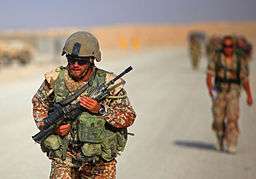Newspapers follow suit when Danish politicians go to war

Danish newspapers mirror to a high degree the viewpoints of the political elite when Danish military participation in Afghanistan, Iraq and Libya has been on the public agenda during the past 10 years. Researchers at the University of Copenhagen have tested the so-called 'elite-driven media' theory on editorial viewpoints on the military engagements and the results may help explain why support for the war efforts have been remarkably consistent in the small and hitherto less belligerent nation.
While political discussions concerning the wars in Afghanistan, Iraq and Libya have been heated in many countries, political parties and public opinion in Denmark have generally been supportive of the war efforts during the last decade, despite the high level of involvement by Danish forces and – relatively speaking – high level of casualties.
A newly published Danish analysis, conducted by media researchers from The University of Copenhagen, covers five national dailies and their editorial stances on the wars in Afghanistan, Iraq and Libya.
"Our research demonstrates, as the 'elite-driven media' theory suggests, that the editorials reflect dominant viewpoints among the political elites: When the elites are in agreement, the newspapers display a similar agreement and reproduce dominant arguments. When political elites disagree, it makes room for a higher degree of diversity among the newspapers," says Professor Stig Hjarvard who has conducted the analysis with his colleague Associate Professor Nete Nørgaard Kristensen. Their findings have been published in the April issue of the international journal Media, War & Conflict.
Limited focus on the soldiers' experience
The four national newspapers Jyllands-Posten, Berlingske, Politiken, and B.T. have generally been supportive of the Danish military efforts, particularly in the case of Afghanistan and Libya. During the invasion of Iraq there was disagreement among the newspapers – mirroring the political divisions in the Danish parliament and public opinion in general. However, when dominant political parties reached consensus about the subsequent deployment of Danish troops in Iraq, critique in the newspapers became less dominant.
"The analysis clearly shows that the arguments in favor of military efforts have to a large extent concerned humanitarian ideals and general international obligations towards alliance partners in the 'war against terror'. The editorials of Danish dailies have only to a limited extent dealt with the specific assignments, problems and consequences Danish soldiers have been facing during the three wars, explains Nete Nørgaard Kristensen who points to the niche newspaper Information as the only media in the analysis that departs from the overall pattern. To a higher degree, this newspaper has been able to develop and sustain editorial viewpoints independent of existing consensus among the political establishment.
"Such niche media as Information may, therefore, play an important role for sustaining alternative arguments when the political elites and the major news media display a high level of consensus," she says.
Stig Hjarvard concludes: "Considering the important role of national news media in framing the public agenda during these three wars, the existing news media supply may not be sufficient to ensure a diverse representation of arguments and viewpoints when politicians have decided to go to war."
Provided by University of Copenhagen
















